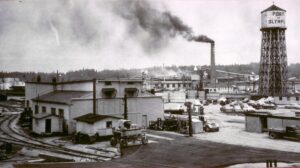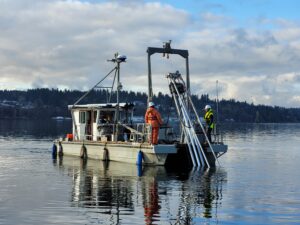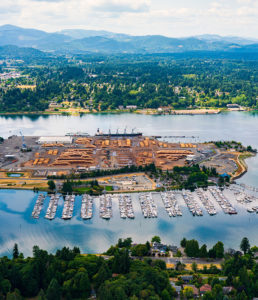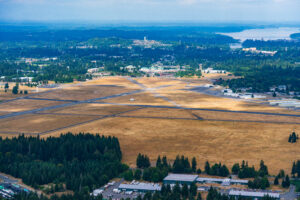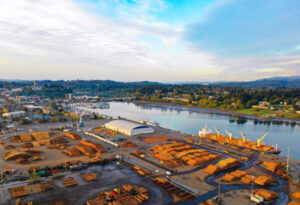Port of Olympia Blog
Welcome to our Environmental Blog Series from Port of Olympia Environmental Manager Jonathon Wolf. This blog series focuses on a variety of environmental topics from Budd Inlet cleanup updates and general education about southern Budd Inlet to other environmental concerns and projects at the Port. Subscribe to receive upcoming posts to your inbox.
Pollution Comes in Many Forms
The Port’s Budd Inlet Cleanup Project is focused on legacy pollution in the sediments of Budd Inlet, but did you know that there are other forms of pollution that enter the bay every day?
In simple terms, pollution enters Budd Inlet through a variety of ways, including yard waste, wastewater, stormwater runoff and other sources that are not easy to identify, such as farms. Nitrogen is one type of pollutant that can be found in these sources. While nitrogen is naturally present in marine waters and marine life requires nitrogen, too much nitrogen fuels excessive algae growth, resulting in “low dissolved oxygen.” When oxygen is depleted, it can cause stress, and even death, in aquatic organisms.
What’s Low Dissolved Oxygen Doing in my Yard Waste?
Plants not only contain nitrogen, but yard waste is often also covered with fertilizer, a.k.a., nitrogen. So, not only do plants that decompose in marine water use up oxygen, but the nitrogen released from the plants encourages more algae growth that also decomposes and uses oxygen.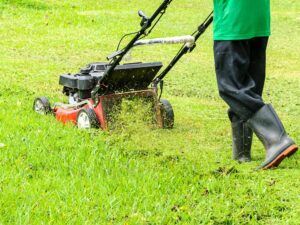
It is vital that yard waste be disposed of correctly and not be allowed to enter Budd Inlet. Placing yard waste near storm drains or directly into local lakes, streams, wetlands and bays is illegal as it can be hazardous for humans, animals and the environment. For example, yard waste pollution can lead to sickness in animals and humans if it is treated with fertilizers or pesticides and it can cause harmful algae blooms from excessive growth of algae.
When working in your yard this fall, be sure to place leaves, grass, and other yard waste in a compost bin or drop it off at a yard waste collection site.
Learn more about the proper disposal of yard waste—as well as its many beneficial uses—at Washington State Department of Ecology.
Low Dissolved Oxygen from Capitol Lake
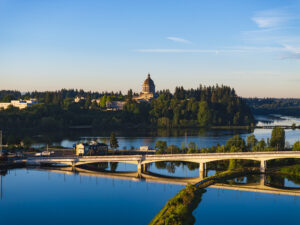 Although yard waste, wastewater and storm run-off can contribute to low dissolved oxygen, the greatest source of low dissolved oxygen in Budd Inlet comes from the adjoining Capitol Lake, owned and managed by the Department of Enterprise Services (DES).
Although yard waste, wastewater and storm run-off can contribute to low dissolved oxygen, the greatest source of low dissolved oxygen in Budd Inlet comes from the adjoining Capitol Lake, owned and managed by the Department of Enterprise Services (DES).
According to a report from Washington Department of Ecology, dissolved oxygen depletion in Budd Inlet from Capitol Lake is as large as 3 milligrams per liter. A healthy level of dissolved oxygen in water is around 7 milligrams per liter. At 5 milligrams per liter, we start seeing stress in animals and lower than that, death can occur. With that in mind, Capitol Lake alone can contribute enough to the low dissolved oxygen in Budd Inlet to reach a stressful level for animals.
While we need to address all potential pollutants in the bay, the most important action needed to improve water quality standards in Budd Inlet is the development and implementation of a long-term management solution for Capitol Lake before the dam is removed in 2033.
What is Being Done To Improve Water Quality in Budd Inlet?
Washington Department of Enterprise Services is in the early stages of a project to restore Capitol Lake into a functional estuary, which in turn will help address the low dissolved oxygen in Budd Inlet. The Port is also currently collecting data so that scientists can inform the creation of a plan to clean up the contaminated sediment from historical industrial activities. These two projects combined will have huge and lasting impacts on both sediment and water quality in Budd Inlet.
Learn More
Find more information about Budd Inlet at www.PortOlympia.com/BuddInlet. You can also email questions to BuddInlet@PortOlympia.com and we will do our best to answer them.
Sign Up for Environmental Updates
If you’d like to receive this blog series to your inbox, sign up for our Environmental Blog Series email. Some of the topics planned for upcoming issues include salmon and shellfish management practices, sea level rise concerns and other issues impacting Budd Inlet and areas in and around the Port of Olympia.
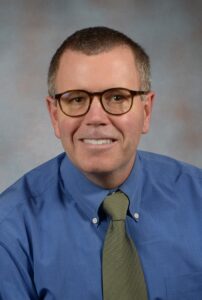 About Jonathon Wolf
About Jonathon Wolf
Jonathon Wolf is the Environmental Manager at the Port of Olympia and the lead scientist overseeing the Budd Inlet Remediation project. Jonathon has 25 years of environmental management experience including 18 years as Deputy Director of Natural Resources at the Skokomish Indian Tribe and six years at Washington State Department of Fish and Wildlife.

